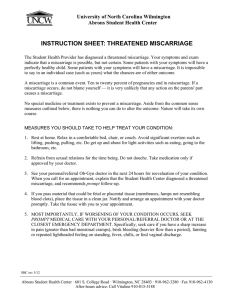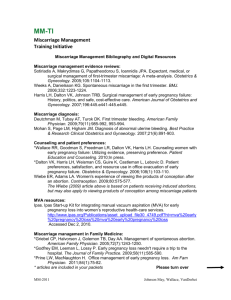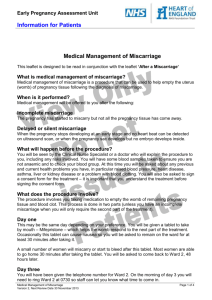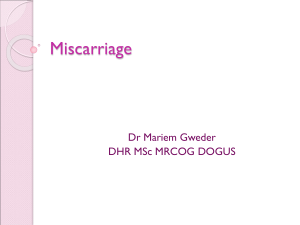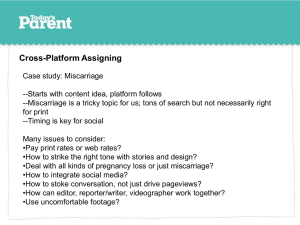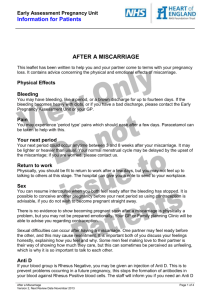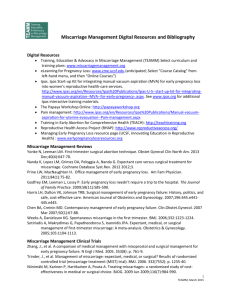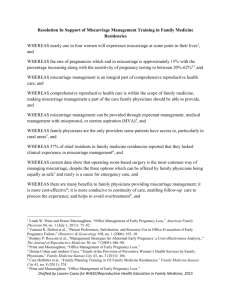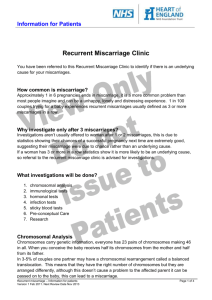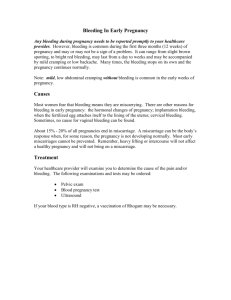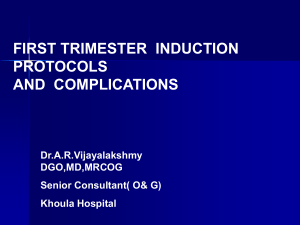Patient information Spontaneous abortion (miscarriage) and
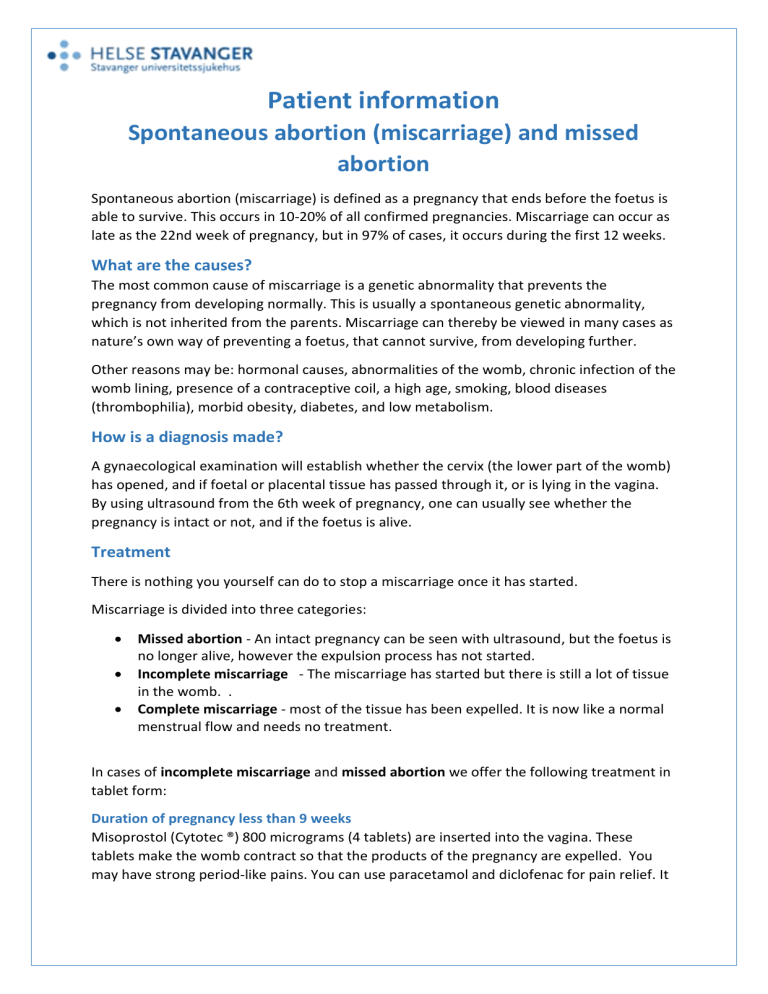
Patient information
Spontaneous abortion (miscarriage) and missed abortion
Spontaneous abortion (miscarriage) is defined as a pregnancy that ends before the foetus is able to survive. This occurs in 10-20% of all confirmed pregnancies. Miscarriage can occur as late as the 22nd week of pregnancy, but in 97% of cases, it occurs during the first 12 weeks.
What are the causes?
The most common cause of miscarriage is a genetic abnormality that prevents the pregnancy from developing normally. This is usually a spontaneous genetic abnormality, which is not inherited from the parents. Miscarriage can thereby be viewed in many cases as nature’s own way of preventing a foetus, that cannot survive, from developing further.
Other reasons may be: hormonal causes, abnormalities of the womb, chronic infection of the womb lining, presence of a contraceptive coil, a high age, smoking, blood diseases
(thrombophilia), morbid obesity, diabetes, and low metabolism.
How is a diagnosis made?
A gynaecological examination will establish whether the cervix (the lower part of the womb) has opened, and if foetal or placental tissue has passed through it, or is lying in the vagina.
By using ultrasound from the 6th week of pregnancy, one can usually see whether the pregnancy is intact or not, and if the foetus is alive.
Treatment
There is nothing you yourself can do to stop a miscarriage once it has started.
Miscarriage is divided into three categories:
Missed abortion - An intact pregnancy can be seen with ultrasound, but the foetus is no longer alive, however the expulsion process has not started.
Incomplete miscarriage - The miscarriage has started but there is still a lot of tissue in the womb. .
Complete miscarriage - most of the tissue has been expelled. It is now like a normal menstrual flow and needs no treatment.
In cases of incomplete miscarriage and missed abortion we offer the following treatment in tablet form:
Duration of pregnancy less than 9 weeks
Misoprostol (Cytotec ®) 800 micrograms (4 tablets) are inserted into the vagina. These tablets make the womb contract so that the products of the pregnancy are expelled. You may have strong period-like pains. You can use paracetamol and diclofenac for pain relief. It
is best to carry on with normal activities as best you can, and you can also eat and drink normally.
If the bleeding hasn't started after four hours you should take 2 tablets of Misoprostol (400 microgram) every 3 hours. This can be repeated 3 times.
You must have another adult at home with you.
You will receive a check-up appointment at the Gynaecological Outpatient's Clinic after one week. There, a new gynaecological examination is carried out. If the treatment has not resulted in a complete miscarriage, you will be offered to have your womb emptied under general anaesthetic. This is a small operation where the remaining tissue is sucked out via a small plastic tube. You can return home the same day.
Duration of pregnancy more than 9 weeks
The same treatment as described above, but you will be admitted to the Gynaecological
Ward 4AC. This is because heavier bleeding and stronger pain are expected, depending on how far along the pregnancy is. An ultrasound examination is performed via the vagina before returning home, to ensure that the miscarriage is complete
You should be aware of the following things in connection with a miscarriage:
Pain similar to period pain is normal.
Use sanitary pads, not tampons, as these increase the risk of infection
It is normal to experience bleeding for the first 2-3 weeks. Contact the
Gynaecological Ward 4AC if you have such heavy bleeding that you feel dizzy and unwell. Contact us also if you have increasing pain or a temperature over 38
C.
A brown or dark reddish discharge over several weeks is also normal. Your periods will usually resume 4-6 weeks after the miscarriage; the first period is often heavier and longer than normal.
Intercourse and bathing should be avoided as long as there is bleeding, due to risk of infection.
If you are starting on contraceptive pills, you can commence the same day as the miscarriage.
You will usually receive a sick note for the day you attend a check up, and for two further days.
Most women who have experienced miscarriage will have a normal pregnancy afterwards.
Studies have shown that there is no increased risk of a new miscarriage in women who become pregnant within 3 months of a miscarriage.
Important tel. nos.:
Gynaecological Outpatient's Clinic from 08.00 to 15-00 on weekdays: 51 51 93 85
Ward 4AC after 15.00, or on weekends: 51 51 82 92
Kvinneklinikken SUS, januar 2015 www.sus.no/kvinneklinkken

